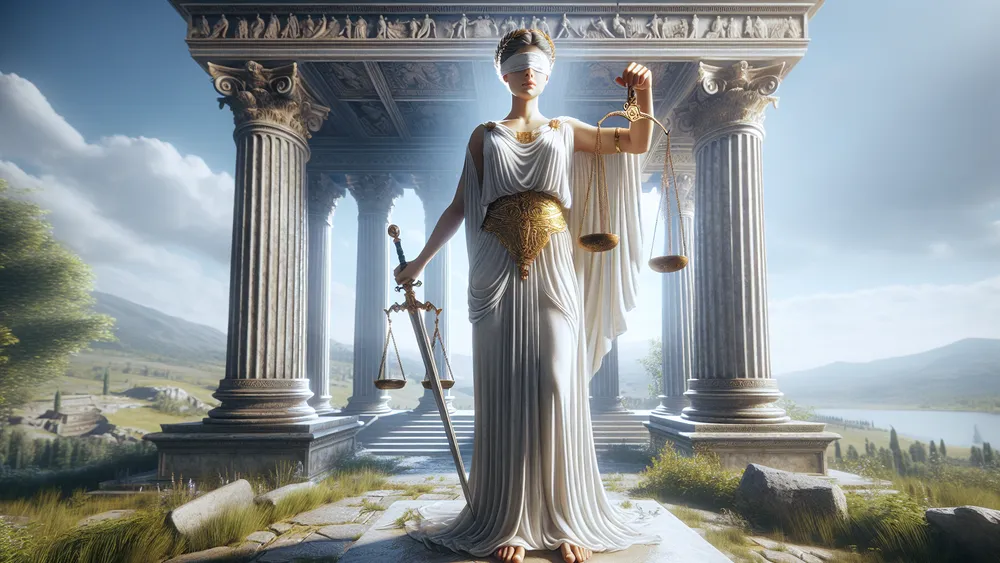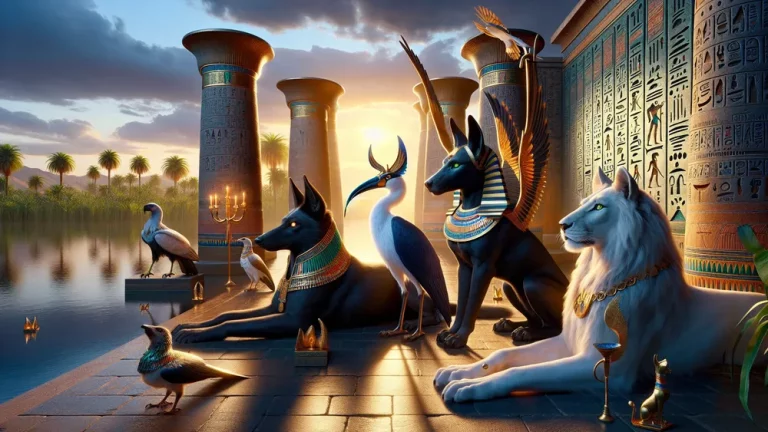Themis: Greek Goddess Of Justice And Divine Order
In the huge picture of Greek myths, Themis is a person of big importance, linked to justice and divine order. Think of her as an old-time example of fairness, like a wise judge keeping balance and rightness in the ancient world. As you start to learn about Themis, you can think of her like the rules and ethics that guide us today.
Key Points:
- Themis is the Greek goddess of justice and order.
- She is the daughter of Uranus (Sky) and Gaia (Earth).
- Themis is a Titaness and sister to Cronus and Rhea.
- She advises Zeus and helps maintain balance in the universe.
- Common symbols of Themis include scales of justice and a blindfold.
- Themis is linked with the Oracle of Delphi, providing wisdom.
- Her influence is still seen in modern laws and justice systems.
This beginning will be your way to know where Themis came from, what she did, and how she made things happen that kept going far after myths, into Greek culture and more. It doesn’t matter if you’re new or just want to know more about these tales, this path will mean how Themis’s past still helps us see what justice and order mean.
Themis: Overview and Key Facts
| Key Aspect | Details |
|---|---|
| Name | Themis |
| Role | Goddess of Justice and Rules |
| Parents | Her Dad is Uranus, Mom is Gaia |
| Siblings | Family includes Titan people like Cronus, Rhea, Oceanus, Hyperion |
| Partner | Zeus, chief god in their stories |
| Children | Horae (Seasons) with Moirai (Fates) |
| Symbols | Justice scales, eye cover, and sword stuff |
| Stands for | Means fairness, law rules, and order |
| Cultural Influence | Important to Greece systems on both moral, law stuff |
| Tied to Oracle | Linked with Delphi speakers, shows wisdom from gods |
| Myth Story Role | Gave advice to Zeus, especially with Titanomachy events |
| Legacy | Impact on today’s views of fairness and law systems |
The Beginnings of Themis
To really understand Themis and her part and how she matters in those big Greek myths, you need to look into where she started and also the family links that affected what would happen to her. We should see her start and how those basic things made her be with other Titans.
How Themis Came to Be
In Greek myths, Themis appears as a critical person. She is born from the joining of Uranus, who is seen as the sky, and Gaia, who means the earth. This famous background puts her in with the Titans, strong gods who came before the Olympian gods. Picture her family as a big group, each one having their own spot that mattered. Themis’s brothers and sisters including well-known ones such as Cronus, who took down Uranus, and Rhea, who is the mother of Zeus. As a Titaness, Themis is about justice and order, essentials in the universe. Her part in stories is like a force that means nature and rightness laws are kept. To see her family relations, here are her closest family members and what they are about:

- Uranus (Father): The Sky, standing for the heavens.
- Gaia (Mother): The Earth, meaning life and growth.
- Cronus (Brother): Leader of the Titans, known for his actions against Uranus.
- Rhea (Sister): Mother of the Olympian gods, like Zeus.
- Oceanus (Brother): Titan of the sea, meaning the big waters.
- Hyperion (Brother): Titan of light, tied to the sun.
Themis is a key figure in Greek myths, representing justice and order, and is part of a powerful family of Titans, including her parents Uranus and Gaia, and siblings like Cronus and Rhea.
The Part Themis Played in Greek Mythology
Themis, a god about justice and order, had an important part among Greek gods. Her presence was like a strong post, meaning the universe worked fairly and rightly. Think of her as an old world’s version of a legal system, where her effect touched both gods and people, guiding them towards right things and choices.
The scales of justice often mean her, a sign that’s known even now, showing the balance she kept in the universe. Her part did not only mean symbols; she joined the council and helped Zeus and other gods on what to do about laws and rules.
This helping role shows she mattered in keeping the balance of the universe, like a judge who explains and uses the law for society’s peace. The effect of Themis touched outside the gods to even the basic make-up of old Greek society. Her ideas about justice and order were like the base of rules and laws that led Greek lives.

Think of her as a moral guide, showing people and groups how to act right and have fair ways. Themis’s impact is seen in setting up laws and habits that highlight fairness, equality, and rules. These rules were part of how Greek city-states worked, where law books and duties matched her teachings.
By meaning ideas of justice and order, Themis helped build a place that valued these things, affecting not only the laws then but also leaving a mark that still matters in today’s law systems.
Themis’s Meaning and Traits
To better get the meaning of Themis, we must look at the signs and traits that mean her role in old stories. We will look into the ways she is shown and the links that point out why she matters.
Things That Represent Themis
Themis is often shown with some symbols that mean her part as the goddess of justice and order; each has deep importance and what it means. Think of these signs as being like items a judge uses, each one helping in the hunt for justice. A well-known one is the scales of justice. It means balance and fairness, similar to scales in court that weigh things fairly. The blindfold is another one. It means fairness, saying justice should be given out without taking sides. Sometimes, Themis also appears holding a sword. This means the power needed to keep laws. To get these symbols better, here is a list of symbols tied to Themis:

- Scales of Justice: Means balance and fairness when making decisions.
- Blindfold: Means fairness and being fair in giving out justice.
- Sword: Means power to keep and use laws.
Themis and the Oracle of Delphi
The link between Themis and the Oracle of Delphi is an interesting part of her story, as she was one of the first gods tied to this famous place for future-telling. Located on Mount Parnassus’s slopes, the Oracle was thought of as the center of the world by the ancient Greeks and worked like a way for messages from gods.

Think of Themis as an early keeper of this holy site, like a wise advisor who gave ideas and vision to those asking for help. This link means she had a deep connection to divine order and justice, as she was believed to give truths that matched the cosmic balance she stood for. Her part in future-telling is highlighted as she gave wisdom sought by both humans and gods.
Themis was seen as a sign of godly knowledge and guidance, extending beyond her link with the Oracle. People thought her ideas were valuable, like a trusted advisor asked for advice when unsure. In stories, her wisdom was not just about telling the future but also knowing natural rules and moral laws. Her advice matched the divine order, giving clear direction in a sometimes troubled world.
The view of Themis as a strong hold of wisdom and advice makes her a key figure in Greek tales; her effect was felt by both gods and humans, shaping actions to match the justice and order she stood for.
Themis in Mythological Tales
Now that we’ve gone over Themis’s deep effect and smart ways, it is time to look into the interesting stories where her role and help were very important. Let’s go through some old stories that mean her impact.
Themis and the Great Battle with the Titans
The battle with Titans, a big fight in Greek stories, put the Titans against the Olympian gods, as they struggled for control over everything. Themis, though a Titan, supported the gods, a choice that showed her dedication to justice and order.
Think of this fight as a big strategic situation, where every move was important, and Themis appeared like a smart helper, guiding the Olympians with her wisdom. Her part wasn’t just picking sides; it was deeply linked to her understanding of the natural way things needed to be and the need for a new time with the gods in charge.
This match with Zeus and his group was important, as Themis’s ideas helped make the plans that would lead to the Olympians winning. During this time, Themis’s role as a helper to Zeus was much needed, helping them figure out the hard parts of the fight. Her knowledge of what Titans could and couldn’t do gave the gods an edge, letting them plan and react better.
Themis’s help wasn’t just about making plans; it also made sure the gods acted fairly and kept the right balance in the universe. She showed Zeus more than just the fight, telling him about the bigger results and the need to make a fair rule once the Titans lost. Themis’s advisory role in the battle shows her as a bridge between Titan times and the new Olympian rule.
Her choice to back Zeus was proof of her forward thinking and belief in change for the greater good. By staying with the Olympians, Themis made sure that justice and order would be key in the new world.
Her role in this big fight is a strong example of how her wisdom and help were needed in shaping the way Greek stories went, affecting not just this fight’s outcome but also setting up a new time under the Olympian gods.
Themis and Making the Rules
In Greek stories, Themis is often seen as the godly planner of laws and ways of life, a role that means her deep effect on the moral and legal structure of old societies. Think of her like an old-time rule maker, setting out the rules that led both gods and people.

Myths will often see her as the example of fairness and order, who set up the key rules that kept things fair and in line. One story talks about how Themis, with very great wisdom, put down the laws for good behavior of both gods and humans, making sure every act matched the bigger order of everything.
Her help was key, as it was needed to keep balance and stop things from going wrong, just like a modern base for a country’s laws. Themis’s effect went past just making laws; it set community norms and fairness too. Her touch was seen in the lives of old Greeks, as her rules were within their culture’s structure.
Imagine her as a leading force, much like a well-known judge whose decisions set examples that shape how laws are understood later. Themis’s ideas around fairness and equality were seen in the customs that controlled social doings, ensuring justice was real, not just a godly idea.
Her hit on social norms was deep, as she defined what was fair or not, changing how legal systems grew that held to these values. Through her role as a rule and customs maker, Themis left a lasting mark on the old world, shaping how justice was known and done.
Themis played a crucial role in shaping laws and fairness in ancient Greek society, influencing both moral values and legal systems.
Themis’s Lasting Impact
Now that we know about Themis’s basic parts in forming laws and social rules, let’s now see how her effect reaches past myths into art and modern justice systems.
Themis in Art and Everyday Life
Themis is a well-known figure in old art and sculpture, often seen as a calm and in-charge figure meaning justice and order. In old Greek art, for example, she often appears with the scales of justice, an image that means her part in keeping fairness and balance. Just think of her like an earlier version of the present Lady Justice, whose picture is known in courts everywhere.
Sometimes, Themis appears with a blindfold, which means fairness, though this part became more common in later pictures of justice figures. Sculptures and carvings from ancient Greece show her respectful presence, making clear her part as a god-like judge. These artistic views not only make clear her importance in stories but also reflect the social ideas of justice and order that she means.

And now, to better see how Themis has been shown in different societies, have a look at this table. It compares various ways of showing her, giving insight into how her character is understood in other societies.
| Society | Art Representation | Main Features |
|---|---|---|
| Ancient Greece | Sculptures and carvings | Scales of justice, sometimes with blindfold |
| Roman Empire | Statues and coins | Like Greek images, often with toga |
| Renaissance | Paintings and wall art | Focus on balance and staying calm |
| Modern Era | Court statues and legal icons | Blindfold, scales, and sword |
These artistic views of Themis in societies mean her lasting mark as a symbol of justice and order, which reflects the universal ideas she carries.
How Themis Shapes Today’s Justice Systems
The ideas with Themis, like fairness, balance, and not being biased, strongly shape our laws today, and they mean a lot in the world of justice. Think of Themis as the old-time example of these ideas, much like the scales of justice we see in courts now for what is right and fair.
Her focus on fairness means a lot for the modern rule of due process, which makes sure everyone gets a fair trial. The idea that all are equal before laws, a base of today’s justice systems, reflects Themis’s promise to justice without preference or bias.
These ideas are not just thoughts; they are put to use in legal systems worldwide, helping judges and lawmakers work towards a fair society. By looking at Themis’s effect, you can see how old stories still shape what we value in our legal systems today.
Pantheon of Greek Mythology Titans
The Titans, a strong group of gods in Greek mythology, came before the Olympian gods and played a critical part in the story of myth. They were kids of Uranus (Sky) and Gaia (Earth), and their rule was known for their great power and effect over the universe.
When you learn about the stories of these old beings, you will find their layered ties and large fights, like the Titanomachy, which led to them losing power and the rise of the Olympians. To get a full view of these interesting figures, you can look at this full list of all Greek Titans, which says a lot about each Titan’s part and mark in Greek myths.
FAQs
1. Who were Themis’s parents in Greek mythology?
Themis’s parents in Greek mythology were the primordial deities Uranus and Gaia.
2. What are the symbols associated with Themis?
The symbols associated with Themis typically include the scales of justice, the blindfold, and occasionally a sword, each representing balance, impartiality, and authority in the realm of justice.
3. How did Themis influence the Oracle of Delphi?
Themis influenced the Oracle of Delphi by being one of its original prophetic deities, imparting divine wisdom and guidance.
4. What role did Themis play in the Titanomachy?
The role Themis played in the Titanomachy was as an advisor to Zeus and the Olympians, providing guidance and support during the war against the Titans.







